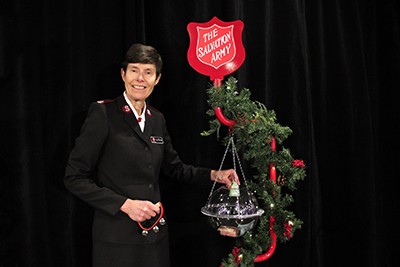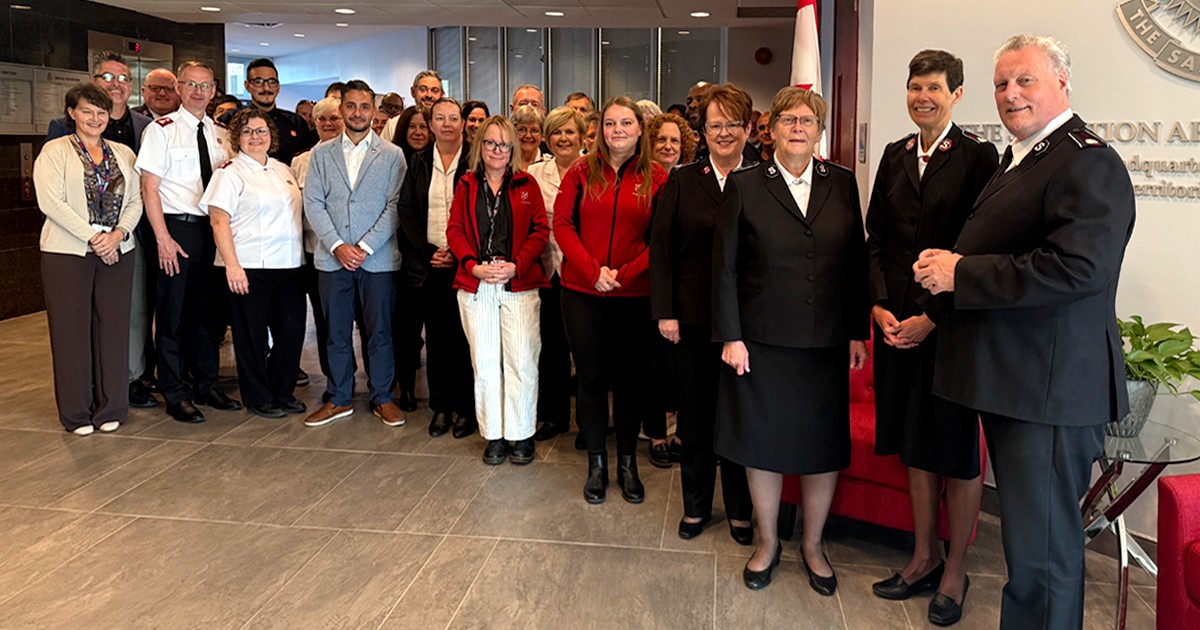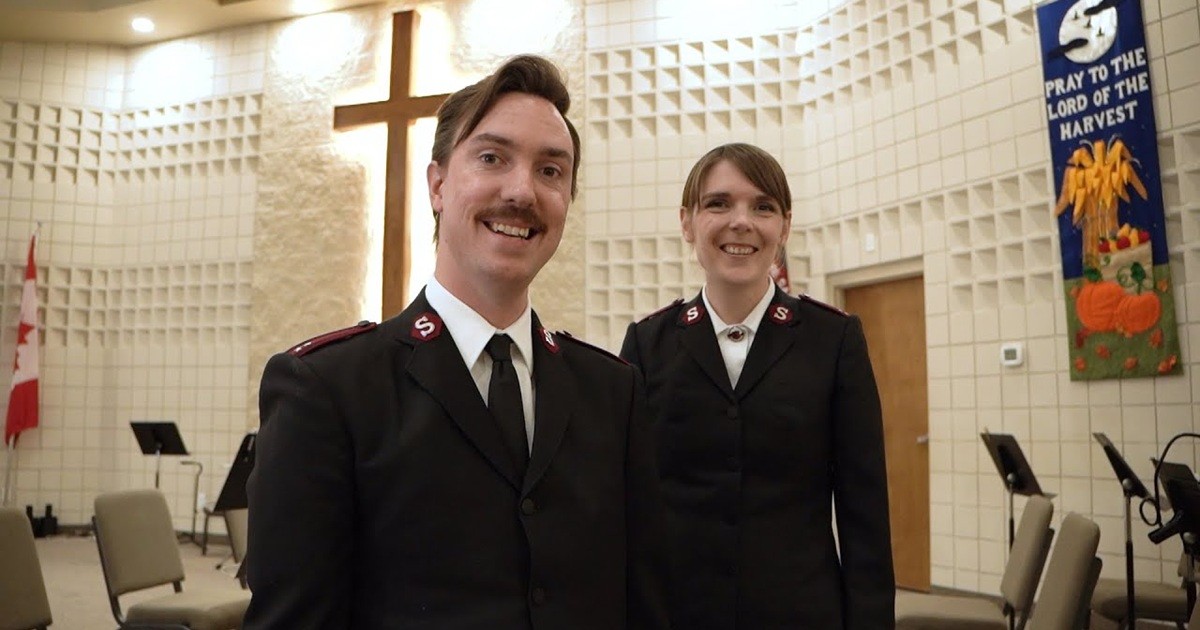Colonel Margaret McLeod has served in a range of appointments over more than 30 years of officership, from corps ministry to divisional leadership, and most recently as assistant training principal at the College for Officer Training (CFOT) in Toronto. On October 1, she stepped into a new role as chief secretary of the Canada and Bermuda Territory.
In conversation with staff writer Abbigail Oliver, Colonel McLeod shares her journey from teaching to preaching, the many experiences and passions that have shaped her, and her hopes for the Army in this season.
Tell me about yourself and your call to officership.
I am from Medicine Hat, Alta., and in my early years, I always desired to become a teacher. I got my degree and started teaching, and I quite enjoyed the classroom. Eventually, an opportunity arose for me to teach in Freeport, the Bahamas, for a year. It was during that time that I heard God’s call to become an officer.
I grew up in The Salvation Army, and in my late teens, I didn’t find much fulfilment in the church, so I left and didn’t return until my late 20s. At one point, I taught at a Catholic school, and I began to compare Catholic theology to the Salvation Army theology with which I grew up. It sent me on a journey of asking, “What is God, who is God, and how is God lived out?”
God spoke to me and said, “I’m calling you back into The Salvation Army and into officership.” I moved back to Canada after a year and started training as part of the Crusaders for Christ Session.

How have your previous roles prepared you for this new appointment as chief secretary?
When I think about my journey as an officer, it’s not what I ever expected. When I was commissioned more than 30 years ago, I always thought that I would do congregational work because that’s a passion of mine. And my first appointments were just that—in corps ministry, first at Agincourt Temple and then at Toronto Temple, where I was able to see officership through a new lens. We had a drop-in centre and overnight emergency shelter, and I learned more about the social side of ministry.
I then moved to Georgina Community Church, Ont., yet I still felt the call to teach. I said quietly to God, “If you could ever use me as an officer and a teacher out of the country, I would love to go.” And sure enough, that prayer was answered.
In 2004, I left Canada to serve with The Salvation Army in Papua New Guinea, first at the College for Officer Training, and then as secretary for personnel. In both of those appointments, I had the opportunity to go out into the community and get to know the people who were doing ministry.
After coming back to Canada, I served at the training college in Winnipeg, as an area commander in both Manitoba and Ontario, and as divisional commander inthe then Alberta and Northern Territories Division. Through each appointment, my administrative skills grew.
Two years ago, I returned to the training college, now in Toronto. We’re in a season of change. We’re on the cusp of something new with our officer training, and it’s been exciting to be a part of that.
I’m a firm believer that, wherever I am, God uses those appointments to prepare me for wherever I might go next. And so, when I look back over the years, having served in a variety of ministry settings, I’ve developed different skills as well as a broader and deeper understanding of what The Salvation Army does.
My relationship with God has also deepened over the years, and this has prepared me for greater responsibilities because I trust that in whatever God has called me to do, he will equip me to do it.

In your role at CFOT, you’ve walked closely with sessions of current and future officers. What have you learned about the next generation of officers?
Our officers have such a passion for finding new ways to introduce communities and individuals into a transforming relationship with Jesus Christ. That’s what they’re called to do and that’s what they’re excited about.
I think that the generation of officers who are ministering now want to find ways to reduce obstacles that might get in the way of their ministry. I believe that The Salvation Army and CFOT are in a good position to provide assistance and remove some of those obstacles to ministry.
Many of our officers are seeking the “why” behind the decision-making. Society in general is more accepting of decisions and change when there is a clear why behind it. I think this new generation of officers is one that is willing to accept change, but we need to help them understand why it is important and why it is needed for mission.
We need to continually ensure that our words, actions and decisions reflect kingdom living. - Colonel Margaret McLeod
What do you feel God is calling The Salvation Army toward in this season, and how do you hope to support this as chief secretary?
I think we as The Salvation Army are in a position of influence within the Canada and Bermuda Territory. For those who are marginalized, we can and should try to find ways to meet them where they are, to let them know that they are loved as part of the kingdom, and to influence positive change. Food security, for example, is more than just food security. If the Army can help provide food to a family, we are then helping to stabilize them. Children are getting meals in their tummies so that when they go to school, they can get an education that will help break the poverty cycle later in their lives. It’s not one specific program; it’s about supporting people at every level and speaking into a system so that we can make lasting change for people who are marginalized. And if I can influence in any way, shape or form, some of that equity for all, I’d like to be able to do that.
Additionally, in conversation with colleagues and in listening to leaders around me, I see a shared concern about “mission drift,” a term that’s being used now within the Christian church. We must be mindful that we as The Salvation Army don’t experience mission drift as the outside world continues to infiltrate. We must ensure that the Army, our distinctives and theology, stay on course. I believe God is calling us to live out our faith as kingdom builders. We need to continually ensure that our words, actions and decisions reflect kingdom living. That’s what Jesus taught us.
What excites you the most about this appointment? Are there any specific areas of ministry that you’re passionate about supporting or developing?
I am excited that I now have an opportunity to meet colleagues across our territory who are doing some fabulous work in the communities that they serve. I can see what they are doing and help where I am able. I can take those great ideas of mission and ministry and spread them to others, building on strengths across the territory. I am excited to come alongside my colleagues and ask them, “How are you, and how are things going in ministry for you?”
I’m passionate about congregational ministry because it’s truly life-giving, and I want to ensure that we can support and bolster our corps officers. In the same breath, our community and social mission expressions of ministry are doing some important and unique work. I’d like to be able to help resource our ministry units and be a source of encouragement along the way.
As you prepare to step into this new chapter, is there a message you’d like to share with Salvationists and mission partners across the territory?
I’d say, thank you for your faithfulness. Thank you for your hands, and for coming alongside us to help support the Army in what we’re trying to do for the kingdom.
Your prayers would be appreciated as I step into this role—prayers for clearmindedness so that I may listen and apply what I learn, prayers for good health and prayers for understanding. I, myself, pray that when decisions are made, I can hear both from the Spirit and from those I am working with, so that decisions for our Salvation Army can be made with the strength and the wisdom of the Lord.
Photos: Courtesy of Colonel Margaret McLeod










Leave a Comment